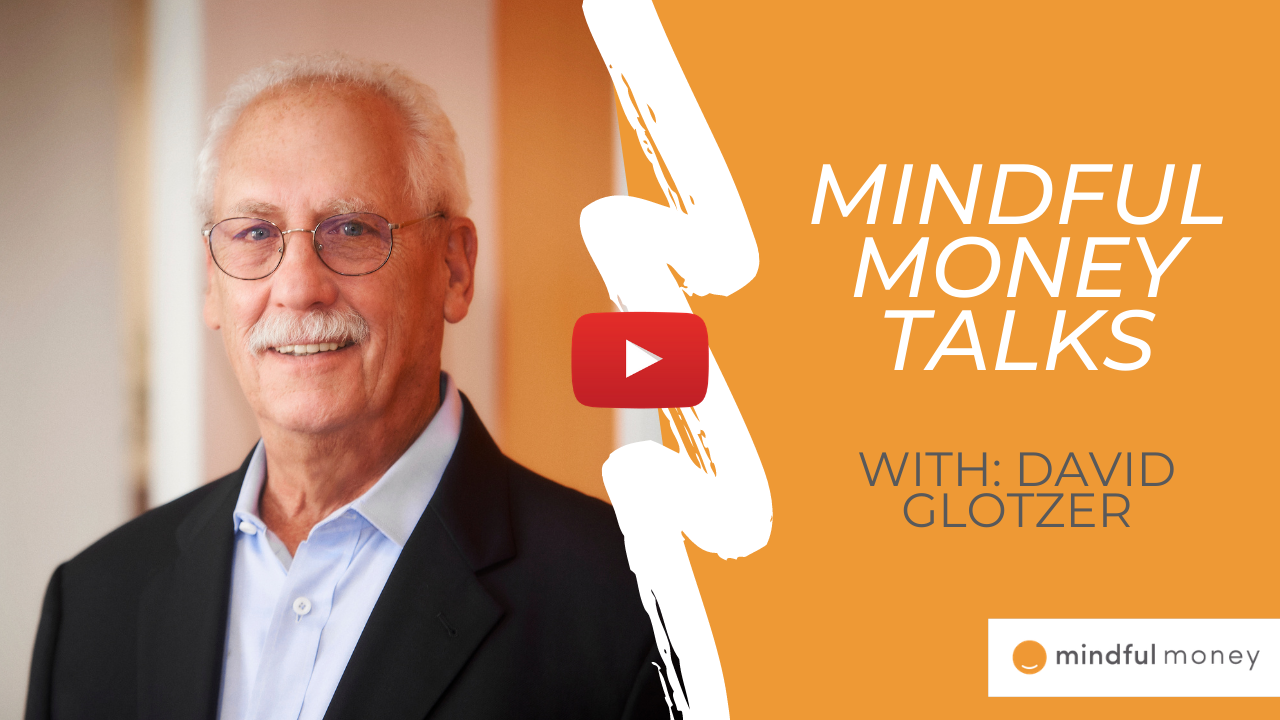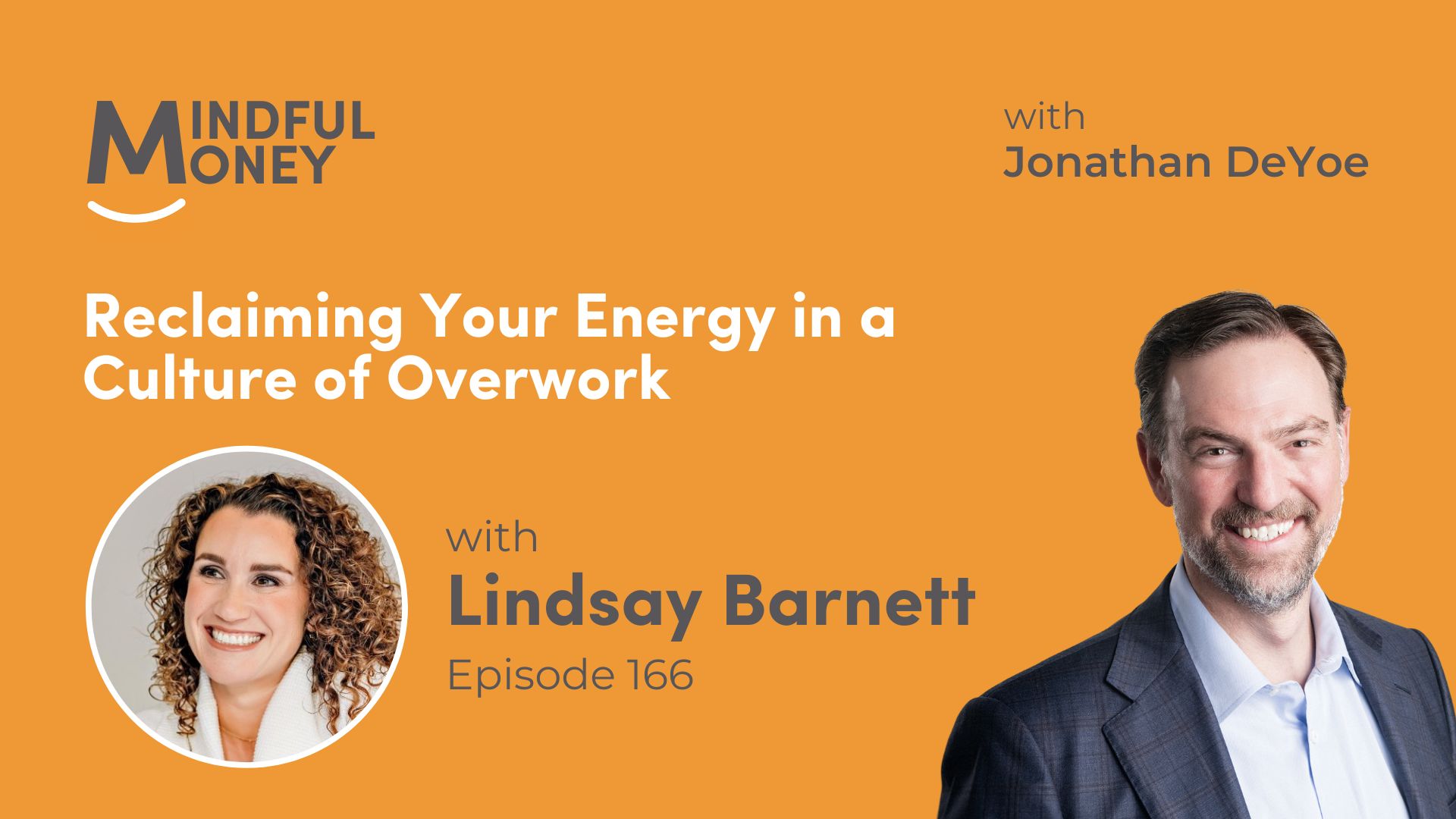Money can be a touchy topic for many people and can even induce anxiety and fears. Many people avoid planning their finances because they believe it will be too difficult. Today in our Mindful Money talk, we interviewed David Glotzer who provided some helpful advice about financial planning and overcoming fear. Continue reading to learn more about how David uses mindfulness to tackle fear and learn to take control of your financial life.
This is the final interview of the Mindful Money Talks series. Get to know the Mindful Money team while learning more about how to be mindful of your money.
FULL TRANSCRIPT
Alessandra Illarramendi: Hello Mindful Money planners and happiness seekers. I am sitting here with David Glotzer who is a wealth advisor at Mindful Money. Hi David, how are you?
David Glotzer: I’m doing good, how are you today?
Alessandra Illarramendi: I’m really good, thank you! David joined Mindful Money in November of 2014 and he has over two decades of experience in the financial world. We are here to talk about his experience and his time at Mindful Money, but we also want to get to know him better so we are going to start with some ice breaker questions. Are you ready?
David Glotzer: I am ready!
Alessandra Illarramendi: Tell me a little bit about yourself.
David Glotzer: Well, I am originally from New York, I moved to California in 1977 after living in New England for 6 years. I have a wife, we just celebrated our 32nd anniversary and I have two children and two granddaughters.
Alessandra Illarramendi: Awesome! If you could pick one animal as your spirit animal what would it be and why?
David Glotzer: I thought this was an interesting question, and I’ve never thought about that. I just decided that a bear might be a good spirit animal in the sense that I’m both social and like to be out and involved in the world, but I’m also introspective and I like to spend time by myself. It’s not exactly hibernation because I do a lot of reading but it’s metaphorically close.
Alessandra Illarramendi: Sounds great, I think a bear is a good option. If you could choose a theme song for your life, which one would it be?
David Glotzer: I was thinking about that, when I was younger in my twenties, my theme song was a song by Bunny Berigan. He wrote the song in 1937, it’s called, “I Can’t Get Started” and now, at 72, if I had a song it would be “I Can’t Get Finished.”
Alessandra Illarramendi: Haha! Well, I’m guessing that it’s been a great 72 years.
David Glotzer: Well there have been ups and downs which I think would be true for anyone’s life, but, surprisingly to me, this last period in my life is probably the best.
Alessandra Illarramendi: Great, if you could describe yourself in three words, what would they be?
David Glotzer: I would say intelligent, empathetic, and progressive.
Alessandra Illarramendi: I love those! What is one thing your coworkers don’t know about you?
David Glotzer: Something I’m not going to tell you either!
Alessandra Illarramendi: Haha, that’s okay! What is something everyone seems to love, and you don’t understand why?
David Glotzer: Rap music.
Alessandra Illarramendi: Yeah I can understand that. Thank you for that now we’re just going to move into the first topic which is a little bit more about your wisdom and experience.
Wisdom and Experience
Alessandra Illarramendi: What’s one thing you wish you would have known when you began your career?
David Glotzer: Well, I have had three careers. I started life as a writer and I published books from the time I was 19 until around 30. Then, I became a fundraiser for nonprofit organizations initially in the Arts. I worked for an organization called, The Magic Theater, in San Francisco. I worked for the San Francisco Art Commission, and then I worked for places like the San Francisco Opera and Museum of Modern Art. Before that career ended, I shifted to educational fundraising and worked in a private school in San Francisco called Lick Wilmerding. I was then Brown University’s West Coast fundraising director.
My last career, the one I’m in still, is as a wealth advisor. Perhaps I would have been happier if I chanced upon this earlier. When I initially transitioned to the industry, I worked for large corporate entities. I worked initially for Mellon Private Wealth. I worked there for about 15 years. Then I moved to a bank, City National Bank, and then finally came to work with Jonathan. I think I would have been happier had I transitioned into the RIA world earlier.
Alessandra Illarramendi: Excellent, what advice would you give to someone who wants to start in the career you currently have?
David Glotzer: Two things. It certainly depends on what role they want to play in the industry but I think in general, it’s a very good industry for people. It pays well, the work is very rewarding and fulfilling. I would say if you have an interest in finance, if you have an interest in helping people, those things are good bases for coming into this industry. I think in today’s world getting the CFA or a CFP would be a very good underpinning for someone.
Alessandra Illarramendi: Excellent! What would be a common myth about this profession or field that you would want to debunk?
David Glotzer: I’m not sure I understand what the common myths might be but there are a lot of parts to the industry and one thing people used to say to me is, they don’t want to put all their eggs in one basket, meaning they don’t necessarily want to work with one adviser. Essentially, underneath that is a misunderstanding of what an advisor does. In our case, we fully diversify client portfolios. So in fact, the eggs are not in one basket, they are in a very broad basket of thousands of companies.
Alessandra Illarramendi: Excellent, what is the one thing you like most about your job?
David Glotzer: I like interacting with people and helping them.
Alessandra Illarramendi: Great, and is there a story in your profession that has touched your heart, and how has it changed your career?
David Glotzer: I think there are many instances where I’ve been able to be helpful to people. In one of my roles, I was at a trust company and so we became trustees on many trusts. The most heartbreaking of those were cases where children have been injured in medical procedures either at birth or in some cases later. As a consequence of those medical problems, they were basically rendered medically incapable of taking care of themselves. Those were very heartbreaking and also very rewarding because we could feel that we were helping those families.
Alessandra Illarramendi: That sounds beautiful. What advice would you give to someone who is starting to plan their finances?
David Glotzer: I think a lot of people delay working on their finances because often there’s a lot of emotional stuff that money brings up. When I think of it, in the 20th-century sex was the biggest hang-up people had, and I think in the 21st-century, money is. That may in part be because the overall consciousness in the world has shifted to money, being a celebrity, and being connected or important. I would counsel people to try and get past those feelings and not delay working on the financial side of your life. I would counsel them not to think it’s too difficult to begin. I’d go back to my original theme song, “I can’t get started” and say, try to figure out a way to get started.
Alessandra Illarramendi: That’s the first step, definitely. What do you think are some specific roadblocks to watch out for during 2021?
David Glotzer: Well, obviously because of the pandemic a lot of people are worried about not only their health but they’re worried about the economy. With the big federal spending, including the bill that President Biden is signing today which is going to put another 1.9 trillion dollars from the government into the economy, people are very worried about inflation. I would say that those fears were overblown in 2008 and 2009 when we had our last major economic recession and people should not behave to that, and not worry about that.
I would say to not let that stop them from thinking about investing. In parallel to that, because the market is very high, that also can be a bar when people are thinking about investing. Over time, if you have a long time period, the level of the market will not be a problem, so I wouldn’t let that stop you either.
Alessandra Illarramendi: Thank you for that sound advice. How do you think disciplined behaviors can have a long-term impact on a person’s life?
David Glotzer: Well, I think disciplined behaviors are essential to a successful life.
Alessandra Illarramendi: What should I ask that I didn’t know enough to ask?
David Glotzer: I’m not sure there’s another question there. However, if we look at the issues people are facing, particularly when they’re starting out, I think the biggest issue for people is beginning behaviors around saving when they’re younger and are barely making enough money to cover their expenses. I think people have to think about starting in a very small way, and beginning to lodge that kind of behavior into their lives and their practices.
Working with Mindful Money
Alessandra Illarramendi: Thank you! Now I’ll be moving into the second topic for today, and it’s your time at Mindful Money. So tell us, how did you start working at Mindful Money?
David Glotzer: Well, it’s a funny story actually. When I was at City National Bank I had become disenchanted with working there. I was looking for a final place for myself but more importantly for a group of clients with whom I’ve been working for a long period of time. I didn’t feel great about City National Bank’s investment activities and in larger companies, it’s hard to predict who’s going to end up working with your clients. I wanted to find a place that I could go, and that they could go with me, where I knew that they would be taken care of after I stop working.
I used to get my shirts tailored in the days when I was wearing suits every day, and when I was with my tailor he asked me whether I was planning to retire or not. I said, “well, ideally, I’d like to find a small investment organization that I can join.” He said, “I have a client who’s running your company in Berkeley”, which is where I was living. Then my tailor said, “maybe you’d like to meet him.” He ended up introducing me and Jonathan DeYoe and that’s how we began our relationship.
Alessandra Illarramendi: That’s an amazing story, it was meant to be!
David Glotzer: Couldn’t predict that.
Alessandra Illarramendi: Not at all, and what is your current role at Mindful Money?
David Glotzer: My role is that I am an advisor and I’m still working with those clients who came over with me, as well as others who joined my practice since I’ve been at Mindful Money. In fact, in November it will be 7 years, and Jonathan and I originally made a 3-year agreement, and we’ve renewed it four times. I keep working both with those clients and I do a lot of editing and writing with regard to articles that we put out.
Alessandra Illarramendi: That sounds great! What does being mindful of your money and financial plan mean to you?
David Glotzer: Being able to recognize your feelings and impulses and being able to accept them while not necessarily behaving to them. A lot of people have anxieties about money and I think you can recognize those feelings and still act more rationally and appropriately. That’s where the mindfulness comes in.
Alessandra Illarramendi: Excellent, and what advice would you give to someone who wants to be more mindful?
David Glotzer: One, I would counsel them to learn more about it and try not to let their feelings block them. A lot of people, women in particular, often feel finances are not in their arena. They have a kind of block to getting involved, and I would say one, it’s not rocket science. I think women are capable, often more capable than men, of dealing with this arena. Actually, one of the things we as a firm are trying to do is hire more women and encourage more women to be involved in the industry.
Alessandra Illarramendi: Perfect, that’s great. What’s the biggest challenge you have with your specific role right now, and what are you doing to overcome it?
David Glotzer: Well, the good news for me is that I don’t have that many challenges at this point. The challenge is always the larger environment. There is a lot of noise in the financial industry. People are always pointing out some reason that they think the market is going to crash or other things of that sort. We constantly have to counteract information in terms of how our clients feel about how they’re doing and what their prospects for the future are. It’s always somewhat challenging to really get people to believe in their plan and integrate their plans in a visceral way in their lives. That’s also part of the fun.
Alessandra Illarramendi: Definitely. How do you continue to learn in order to stay on top of things within your role?
David Glotzer: I try to keep up with the industry in terms of reading a lot of journals. We host a monthly call about estate planning at our office for lawyers and accountants who are interested in that, so I just try to keep up.
Alessandra Illarramendi: That’s what you have got to do! There is a lot going on in the world right now, what are you curious about now and why?
David Glotzer: Well, in the immediate situation, I’m curious about grappling with the pandemic. Also, there are a lot of substantive issues in this economy, which in part, President Biden is trying to address with regard to equity across the economic sectors. I’m very happy about the way things are progressing with regard to legislation and maybe some changes in the tax system, things of that sort.
Alessandra Illarramendi: In your own words, what does the phrase, “mindfulness is a doorway to more rational choices” mean to you?
David Glotzer: I would go back to my discussion earlier about mindfulness with regard to finances. I think mindfulness is a recognition of where you are at emotionally, and at the same time being able to act rationally in the face of that. A lot of times, if people have feelings of anxiety or fear, they want to push those aside and not really look at them. I think mindfulness is a way of being able to look and accept, but also act rationally in the face of that.
Alessandra Illarramendi: Excellent, thank you! With that very mindful note, we have finished all of the questions. I want to give thanks to David for joining us today and sharing his expertise and his time. Thank you, David!
David Glotzer: And thank you!
Alessandra Illarramendi: We hope you enjoyed this series of Mindful Money talks and remember to stop predicting, start planning, and stay mindful!
Takeaways
David emphasizes the importance of being mindful of your emotions and how that carries over to your finances. He also explains the importance of not behaving to your fears and anxieties. Most importantly, acting rationally and taking small steps towards saving can help to set you up for future financial success. Dive in ready to learn and understand how you can make the most out of financial planning.
Ready to learn more about being mindful of your money? Contact us here to get started!






